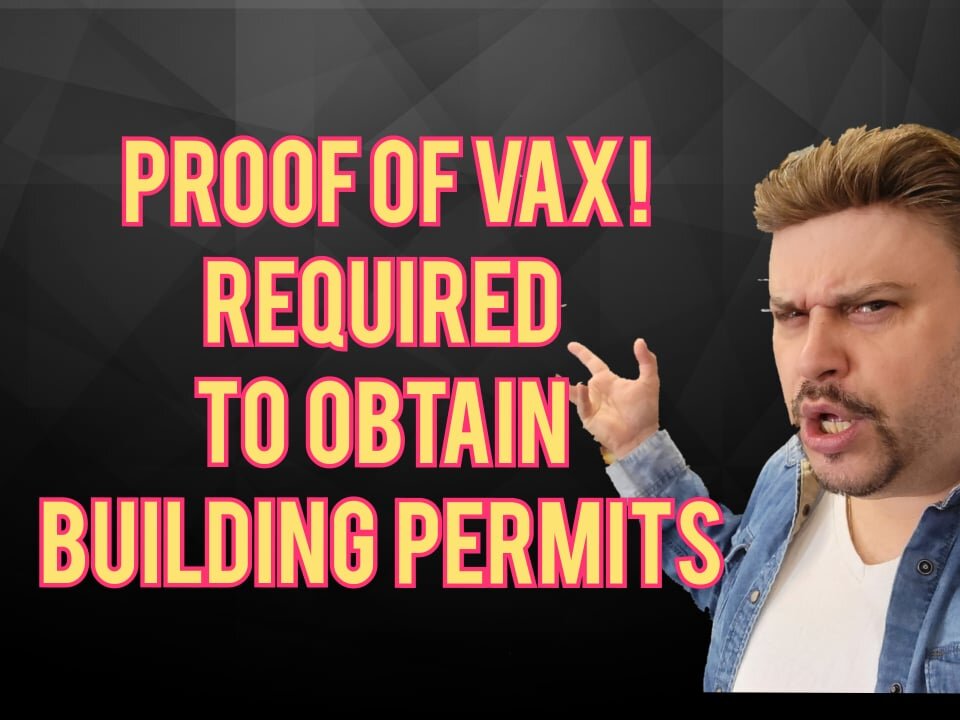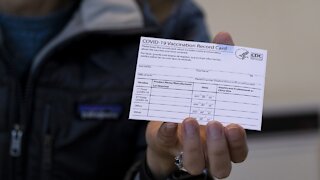Premium Only Content

Proof of vaccination required to obtain BUILDING PERMIT
Link to last nights Show
https://odysee.com/@MikeMartins:7/mikeinthenightE390:a
What a Building Permit Is
A building permit is an approval by a local governmental agency that certifies that work was performed to a certain standard. Because it is styled as a permit (that is, a permission), it needs to be obtained before the work begins. After the work has been completed satisfactorily, the permit is closed out and approved.
Building permits are valid for a set amount of time. Once a building permit has been granted, you do not have an unlimited amount of time to start and complete the work. Usually, you need to start within six months or a year. Projects usually need to be completed within a year or 18 months.
Permits Are Not Always Required
Some homeowners may think that any repair or improvement they do around the house will be scrutinized with a fine-tooth comb by an inspector who is intent on catching every tiny flaw.
In reality, there are many repairs and improvements that can be done without a permit. The rules for this vary widely from community to community, and the same project that requires a building permit and scheduled inspections in one locale may not require one in another jurisdiction.
Generally, you are allowed to replace many existing elements of your home on a one-for-one basis without a permit. Anything that changes the structure of your home or represents a real estate improvement will require a permit.
You can replace a broken light switch or leaky faucet, for example, but adding a deck or room addition calls for a permit. Your community may have online resources that explain what types of work require permits and inspections, or you can call the permit office and ask to talk to an inspector.
You Can Talk to the Permit Office
It's usually possible to call the local building inspections and permit office for advice about permitting, and often you can do so anonymously.
While permit offices increasingly want citizens to seek help online, there are simply too many variables and gray areas that can't be cleared up with online guidance.
The permit office exists to ensure that home improvements are done safely and pose no risk to residents. Inspectors who are in the office and available should be available to answer questions. If there is no inspector currently available, one will call you back.
Permit Costs Can be Prohibitive
Often, there is no set fee for a building permit. Permit costs can vary according to the estimated cost and complexity of the project.
Building a fence may require a $55 permit, for example, while building a large new house might require a $2,000 building permit.
Nationally, the average building permit cost was roughly $1,330 in 2020, with a typical range of about $400 to about $2,200.1
But these average costs include pricy permits for the new construction of entire houses, and there are many projects for which building permits cost $100 or less. It is pretty common for permit costs to be based on a percentage of the anticipated cost of the project. If you are working with a contractor, the costs of the permit is usually included in the bid you've received.
Owner/Builder Permits Can Be Issued
Local inspection offices routinely issue permits to homeowners to do all kinds of work themselves—up to and including serving as a GC (general contractor) when building an entire house. For this kind of project, your community may issue a special owner/builder permit that allows you to act as a GC during the project for a specified period (usually around one year) while subcontracting out the individual tasks for the job.
As an owner/builder, you act as your own general contractor instead of hiring one. This does allow you to save on that painful 15- to 25-percent fee charged by GCs.
But you also carry the burden of potential liabilities, many of which can be serious. Hiring a licensed, insured, bonded contractor better insulates you from these liabilities.
It's critical to know that owner-builder permits do not allow you to work on houses that you do not own.
Some jurisdictions require that you have lived in the house for a certain number of years to get a permit. If you are flipping a house for profit, work must be done by a licensed contractor.
Easements Can Affect Your Project
Wherever a power line, sewer main, sidewalk, or other common-and-continuous service pathway passes through your property, you probably have an easement—a legal restriction that prevents you from making changes that affect or restrict these utility lines or other features.
There are instances where a portion of your property may be reserved for a potential future road. You will be unable to build on any portion of your property where there is an easement on record.
-
 0:32
0:32
Mike Martins Channel
1 month ago $0.07 earnedbeauty of Manila
2132 -
 1:48
1:48
WKBW
3 years agoProof of vaccination required at Highmark Stadium
31 -
 1:27
1:27
The Daily Caller
3 years agoPsaki Won't Say If Migrants Are Required To Show Proof Of Vaccination
8.73K36 -
 0:29
0:29
KIVI
3 years agoProof of vaccination, negative test required at Boise Farmers Market
442 -
 1:11
1:11
KIVI
4 years agoProof of vaccination, negative test required for entry at Treefort 9
391 -
 2:12
2:12
KMGH
3 years agoVaccination proof required to dine at indoor cafeteria-style restaurants within Vail Resorts
373 -
 0:57
0:57
KGTV
4 years agoBusiness requires proof of vaccination
6927 -
 1:49
1:49
WTMJMilwaukee
3 years agoProof of vaccination or negative COVID-19 test required for Milwaukee performing arts organization audiences
25 -
 3:44
3:44
Newsy
4 years agoVaccination Proof Requirements Then And Now
2.58K18 -
 1:04
1:04
NarcityCanada
4 years agoCanada's Proof of Vaccination System
30.7K